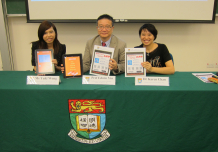Media
Smartphone/Tablet “App” for preventing voice problems – A Green Voice Project
28 Jun 2012

(from left to right): Research Assistant Ms Yuki Y.Y. Wong, Co-Director of Voice Research Laboratory Professor Edwin M.L. Yiu and Assistant Professor Dr Karen M.K. Chan
The Voice Research Laboratory of the Division of Speech & Hearing Sciences, Faculty of Education, HKU, has conducted a series of studies (entitled Green Voice Project) to determine how best to help professional voice users, like teachers, to develop a good vocal behavior habit in order to prevent developing voice problems. In one of the studies, 115 teachers were interviewed through questionnaires between 2007 and 2010. Based on a standardized questionnaire (Voice Handicap Index), 56% of the interviewed teachers had voice problems and 65% of the teachers reported that they had 3 or more vocal complaints within the past 6 months. The complaints included throat dryness, pain in the throat and hoarse voice. The results of the study suggested that there are four main risk factors for developing voice problems in teachers: inappropriate vocal habits (e.g., forceful speech, throat clearing, speak with too high / too low pitch), years of teaching experience (the fewer the years of experience, the more likely to develop voice problems), use of loud voices outside class and number of upper respiratory tract symptoms (e.g., asthma, frequent cold/flu, reflux). A second study measured the acoustic conditions of 248 classrooms in local kindergartens, primary, secondary and special schools. The study found that only 7% of the classrooms had a signal to noise ratio of 15dB or above. The major reason for the poor ratio is the elevated noise level in most classrooms. This teaching environment not only affects the teachers’ vocal health but also affects how the students learn.
Based on the findings, a Smartphone/Tablet “App” (free) has been developed to promote vocal hygiene in order to prevent the development of voice problems. This application, called “YourVoice”, is available in both iOS (iPhone and iPad versions) and Android (Smartphone and tablet versions) platforms. The app is available in traditional and simplified Chinese, as well as in English. It includes simple voice tests to determine whether you are at risk of developing voice problems, as well as some relaxation exercise with video demonstration and voice protection guidelines. You can design your own voice protection program and chart your progress daily.
For media enquiry and interview request, please contact Ms. Queenie Wong, Development and Communications Manager, Faculty of Education, HKU (Tel: 2219 4270 / mobile: 9220 5840 / fax: 2540 6360 / email: qlpwong@hku.hk)
